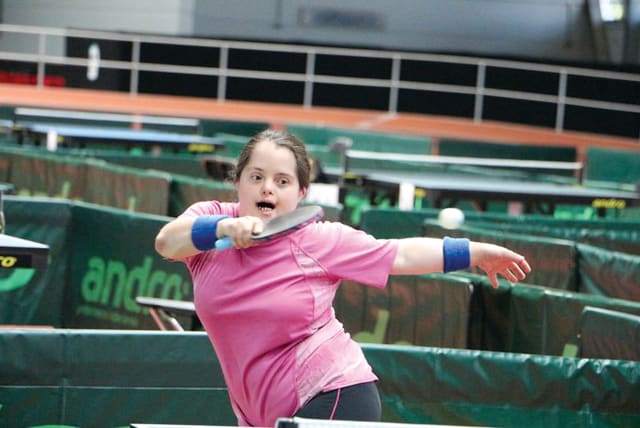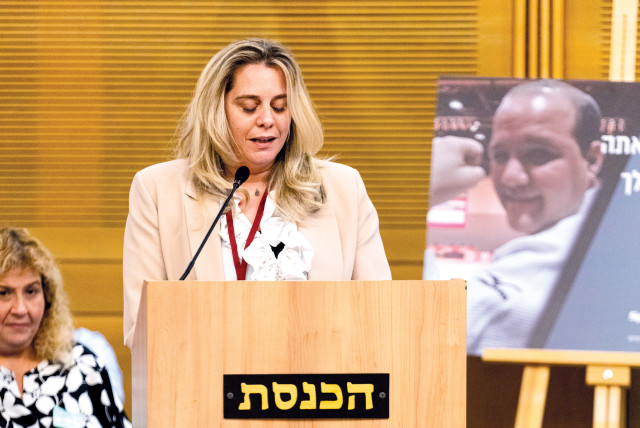Israeli athletes head to Berlin for Special Olympics

The Special Olympics were not active in Israel for many years, while the government funded the regular Olympics and Paralympics. But Culture and Sport Minister Miki Zohar gave it recognition.
When Pazit Rubens competes in table tennis at the Special Olympics in Berlin in mid-June, she will have her own cheering section of her parents, siblings and nieces and nephews. The 34-year-old Pazit, who has Down Syndrome, has competed in past Special Olympics representing Germany and in 2018 won a Kiel gold medal. She is a favorite to win the gold again, this time as an Israeli athlete.
Pazit was born and grew up in Kibbutz Grofit, about 25 miles (40 kilometers) from Eilat.
Her father, Hanan Rubens, told The Jerusalem Report that when she was young, she wanted to go to an after-school folk dancing group, but the instructor feared she would not be able to follow the steps or might not behave appropriately and would not accept her. But there was a table tennis coach who encouraged her to try it, and she quickly showed a natural aptitude for the game.
Hanan says that every week, he or his wife flew with Pazit from Eilat to the Wingate Institute for her to train. Today, she lives in a hostel in Kfar Saba and has trained with the same coach for more than 15 years.
Hanan says that competing in the Special Olympics has given his daughter incredible gifts.
“She is the champion in Germany, and she has learned to stand on the podium,” he said. “She takes the microphone and thanks everyone. It’s amazing for her self-confidence.”
Making the Special Olympics active in Israel
He says that for many years the Special Olympics, which focuses on athletes with intellectual disabilities, was not active in Israel, while the regular Olympics and the Paralympics for athletes with physical disabilities received funding from the government. Now Israel’s Minister of Culture and Sports Miki Zohar has given the Special Olympics recognition as an official sports federation.
“It’s a brave move; it’s just, and it’s inclusive,” Sharon Levy Balanga, the CEO of Special Olympics Israel, told The Jerusalem Report. “It means we will now get funding, but the amount is still under discussion. We’re hoping we will get enough to prepare and train our athletes and to send them to competitions. When they come back, they will be recognized. Until now, we were the only ones to recognize their achievements.”
Sharon made aliyah from London a few years ago and took on her current position. She said there are more than 3,500 athletes in Special Olympics in Israel who compete in 11 different fields of sport. All the athletes in Special Olympics have disabilities such as cognitive delays, intellectual disabilities, severe ADHD, Down Syndrome or are on the autistic spectrum. She says that excellence in sports is important not only for the athletes but also for the public that do not have disabilities.
“It gives these athletes a chance to showcase their gifts and their abilities to everyone watching,” she said. “They invite us into their world. They are telling us to look at their abilities instead of their disabilities. It can completely eradicate our preconceptions of what a person with disabilities can and cannot do. It lets us be in their world, and they feel accepted and equal.”
In 2019, Special Olympics had no funding, but Sharon was determined to send a delegation to the Special Olympics in Dubai. So she launched a crowdfunding campaign and raised NIS 750,000 (almost $215,000) to send a delegation. The delegation of 25 athletes won 22 medals.
Israel has also won dozens of medals in the Paralympic Games, where many of the athletes are former Israeli soldiers. Perhaps because of that, Paralympic athletes have always received funding and recognition from the state. Now Special Olympics hopes that funding will lead to greater awareness about athletes with special needs and more recognition for their role in Israeli society and, eventually, to greater inclusion. ■
Jerusalem Post Store
`; document.getElementById("linkPremium").innerHTML = cont; var divWithLink = document.getElementById("premium-link"); if (divWithLink !== null && divWithLink !== 'undefined') { divWithLink.style.border = "solid 1px #cb0f3e"; divWithLink.style.textAlign = "center"; divWithLink.style.marginBottom = "15px"; divWithLink.style.marginTop = "15px"; divWithLink.style.width = "100%"; divWithLink.style.backgroundColor = "#122952"; divWithLink.style.color = "#ffffff"; divWithLink.style.lineHeight = "1.5"; } } (function (v, i) { });

